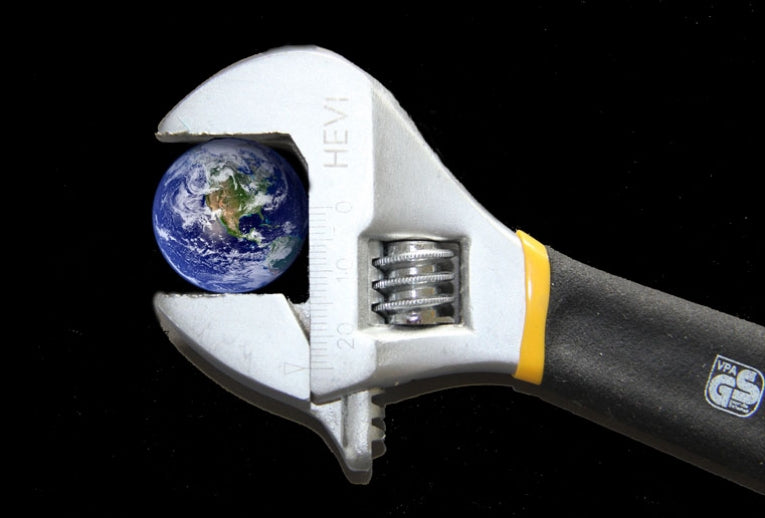As climate change creates increasing impacts on our planetary ecosystem and the pace of carbon reduction makes many people fear that we are moving too slowly to avert a catastrophe, some scientists have promoted GeoEngineering (climate engineering) as a way to stave off disaster.
What is GeoEngineering?
"The deliberate and large-scale manipulation of the earth's ecosystem to reduce the effects of climate change"
Professor Tim Lenton teaches Earth System Science at the University of Exeter in the UK. He gave a talk at the British Library in London last week examining the pros and cons of GeoEngineering and asking which of the various approaches were in any way practical and which were dangerous, and which could contribute to reducing climate change. Most approaches to climate change consist of reducing the CO2 we are putting into the atmosphere. GeoEngineering adds two more methods to combat climate change:
1. Reflecting sunlight back into space
2. Removing carbon dioxide from the atmosphere
Some of the proposed methods are technologically challenging, or very expensive, but some are considered to be relatively cheap, and could be implemented quickly, which isn't the case, for example, if we were to change our whole electricity generation system over to renewables (or nuclear power even). It would take years, probably decades to build the systems and rebuild the supplying electricity grid.

So Professor Lenton advocates some of the GeoEngineering methods as possible "quick fixes" which will help us get out of the difficulties we are in.
To take the first method: reflecting sunlight back into space. One suggestion is putting up giant mirrors in space to reflect the sun's energy before it reaches the earth. Lenton dismissed this as completely impractical: we would need to launch over 100,000 of these sunshades per year, at an enormous cost.

Professor Tim Lenton GeoEngineering seminar at the British Library
The second proposal is to spray aerosols into the atmosphere to "dim" it. Though this sounds mad, there is quite a lot of science to back this up: this is what happens when volcanoes like Mt Pinatubo or Mt St Helens erupted: huge clouds of ash and sulphur particles go into the upper atmosphere and produce a slight dimming of the sun, like a set of dark glasses. Sulphur is a cheap and abundant mineral and the proposals are to pump it up into the atmosphere through 10 km long pipes.
A third reflection project concerns making clouds brighter - by spraying sea salt into clouds they can become more reflective. Though this is tricky, because clouds come in all sorts of types, some eminent scientists like John Latham and Stephen Salter are investigating this area.Finally there is the idea of increasing land reflection, by planting light-coloured crops, or painting house roofs or roads a light, reflective colour to throw the sunlight back. Though this has merits, the actual human urban footprint is small, so this would not be very effective, and crops are needed for human consumption so we may not have the option to do this, although suggestions have been made that normal crops should be genetically engineered to be sunlight-reflective.
What about the second approach?
Klaus Lackner, of Columbia University has invented "artificial trees" which capture CO2, with the intention of burying it for storage. Some people have commented that there are more readily available units to do this already, they are called "trees". Planting forests is a much cheaper route than building techno-gizmos to do the same thing.
Burning charcoal to create biochar is another option, though one that has come into some criticism recently over the stability of biochar. I wrote about Biochar in an earlier Earth Times article here. Professor Lenton estimated biochar could store 33 billion tonnes of carbon, or about 5% of global yearly emissions. This is smaller than some advocates of Biochar have suggested but useful nevertheless, given biochar's uses for heating and soil fertility enhancement.

Professor Tim Lenton GeoEngineering seminar at the British Library
Ocean Fertilisation is another theory: by seeding the ocean with nutrients, algae could be created, which would take up more carbon dioxide, then die and sink to the bottom. Unfortunately more recent experiments have found that the algae did not sink far enough and the carbon taken up was released back to the atmosphere. So this is not a useful method.
None of the geoengineering schemes proposed has had anything other than small-scale or laboratory tests - these need to be carefully scaled up before a large implementation is started, and also there are serious political problems of getting the consent of citizens and governments before experimenting on the "global commons" that is our planet's atmosphere.
Professor Lenton concluded that the sun reflectance methods all had drawbacks and risks, but that carbon dioxide removal was a promising technology and the risks were lower, and already being implemented by such methods as planting forests and greening deserts so should be continued. "If you work hard at Carbon Removal you can at least get carbon levels stable by the mid part of the century and start bringing them down by the end of the century."
Top montage by Julian Jackson.
Links:










